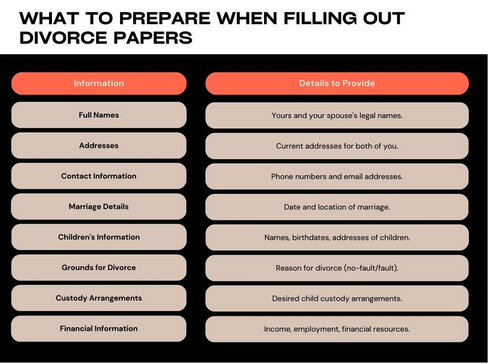Determine the Grounds for Divorce in West Virginia
When embarking on the divorce process in West Virginia, it’s essential to obtain a full answer regarding the state’s specific requirements and procedures. Once you’ve determined the grounds for divorce, your next step is to prepare and file the requisite paperwork. This involves creating a divorce petition detailing your grounds, current living situation, any children involved, and any requests for property division or spousal support. It’s imperative to submit this paperwork to the Circuit Court Clerk in the county where either spouse resides. Due to the complexities involved, seeking legal advice or representation can prove invaluable in ensuring that all aspects of your case are properly addressed. Thorough documentation that accurately reflects your circumstances and desires is crucial for facilitating a smoother judicial process. For more comprehensive guidance, please refer to our full answer checklist on our website.
Verify Residency Requirements for Filing
Documentary evidence such as a valid West Virginia driver’s license, voter registration card, or utility bills showing an in-state address may be required to establish residency. Gathering these documents well in advance is advisable to ensure that your filing process proceeds smoothly. Consulting with a legal professional can also provide guidance on what specific proofs are considered acceptable by the court and how to best present them.
Once residency requirements are confirmed, understanding the best way to file for divorce becomes your focus. This involves selecting the appropriate county courthouse, which typically is where either spouse resides or where you both lived as a couple. Filing in the wrong jurisdiction can complicate your case, causing delays or even necessitating starting over. Hence, paying close attention to these details can save time and resources.
When preparing to file, consider whether you’re filing jointly or if one party will serve papers on the other. The method chosen impacts the subsequent steps and timeframe of your divorce proceedings. In cases where both parties agree on major issues, such as property division and child custody, filing jointly might expedite the process. Conversely, if serving papers is necessary due to disagreement or inability to locate one spouse, additional steps will be required, including potentially involving law enforcement or professional process servers. Understanding these nuances upfront helps streamline the process and set realistic expectations for what lies ahead.

Prepare and File the Petition for Divorce
The West Virginia divorce papers include not just the petition but also financial statements and, if applicable, proposed parenting plans. These documents collectively provide a comprehensive view of your marital situation and how you envision its dissolution. Before submission, review every section meticulously to confirm that all information is accurate and complete. Many choose to have a legal professional examine these documents to ensure they meet West Virginia’s legal standards.
Once your paperwork is prepared, it’s time to file it with the appropriate county court. Filing fees are required at this stage; however, individuals facing financial hardship may qualify for a waiver. Upon successful filing, the clerk will assign a case number to your divorce proceedings—a significant step as this number will be used in all future legal documents pertaining to your case.
Serving your spouse with the divorce papers is mandatory for the process to proceed. West Virginia law stipulates various methods for service, including sheriff delivery or certified mail. Obtaining proof of service is essential for whichever method you choose, as it confirms that your spouse has been officially notified of the pending divorce action. This step solidifies the transition from preparation to active litigation in the pursuit of finalizing your divorce.
Serve the Divorce Papers to Your Spouse
After selecting your service method:
Document every detail of this process.
If using a sheriff or third party, obtain a proof of service document that confirms the date, time, and manner of delivery.
For certified mail, keep the returned receipt as evidence.
This documentation is indispensable as it proves to the court that your spouse has been given legal notice of the divorce action, fulfilling your obligation and allowing the proceedings to advance.
If you encounter difficulties in serving your spouse because they are avoiding service or their whereabouts are unknown, West Virginia law permits alternative methods such as publication in a local newspaper. This option requires court approval and is generally considered a last resort. Consulting with an attorney can guide navigating these challenges effectively.
Upon successful service, your spouse has a set period to respond to the divorce petition. Their response (or lack thereof) will significantly influence the subsequent phases of your divorce process. It’s essential to stay organized and attentive during this period, keeping track of all deadlines and requirements to ensure your case proceeds smoothly toward resolution.
Respond to the Petition if You Are the Respondent
Crafting a well-considered response requires a careful review of the initial petition. If there are disagreements regarding asset division, child custody, or any other substantive issue, these must be clearly articulated in the answer. For respondents unfamiliar with legal documents, consulting an attorney can provide clarity and ensure that their rights and interests are adequately represented in court documents.
If the respondent wishes to introduce new claims or seek different relief than the petitioner initially requested, this is the moment to do so. For example, if spousal support was not mentioned in the original filing but is desired, it should be included in the response. This step underscores the importance of understanding both parties’ desires and expectations from the divorce proceedings.
After preparing their response, it must then be filed with the same court where the original petition was filed. Following proper protocol for submission and ensuring all paperwork is timely and correctly filed avoids unnecessary delays or complications. This responsive action not only signifies active participation in the divorce process but also sets the stage for negotiations or court deliberations that will follow.

Attend Required Mediation or Parenting Classes (if applicable)
Mediation is another step that may be mandated or voluntarily sought in cases where disputes exist over property division, child custody, or other contentious issues. Mediation serves as an alternative dispute resolution method, offering a less adversarial environment than court proceedings. During mediation sessions, a neutral third party assists both spouses in reaching mutually agreeable settlements. This not only speeds up the resolution of your divorce but can also significantly reduce legal expenses.
It cannot be overemphasized how important it is to prepare thoroughly for both mediation and parenting classes. For mediation, coming equipped with documentation and a clear understanding of your goals can facilitate more productive discussions. Likewise, engaging sincerely with parenting classes demonstrates your commitment to your children’s well-being during this challenging time.
Attending these sessions may seem like just another hurdle in an already complex process. They provide valuable opportunities for learning and negotiation that can lead to more amicable settlements and healthier post-divorce family dynamics. Compliance with these requirements also underscores your cooperative spirit to the court, potentially influencing the final terms of your divorce decree favorably.
Finalize the Divorce Agreement and Attend the Final Hearing
Once an agreement is reached, it must be submitted to the court for approval. This submission includes all agreed-upon terms and may also require additional forms depending on your country’s specific requirements. Review all documents thoroughly before the final hearing to confirm their accuracy and completeness. This preparation ensures you are ready to present your case clearly and confidently before the judge.
The final hearing is a crucial step in legally dissolving your marriage. During this proceeding, the judge will review your agreement, ask any necessary questions to clarify points of contention or concern, and ensure both parties understand and consent to the terms. It’s important for both spouses to attend this hearing unless the court excuses them for a valid reason. Being punctual and prepared can positively influence the proceeding’s outcome by demonstrating respect for the court’s time and processes.
After the judge approves your divorce agreement, they will issue a final divorce decree, officially ending your marriage. Receiving this document marks the completion of the legal process. Remember that any agreed-upon terms regarding financial obligations or custody arrangements continue to be legally binding. Following through on these commitments is essential for compliance with West Virginia law and maintaining integrity in post-divorce relations.

























































































































